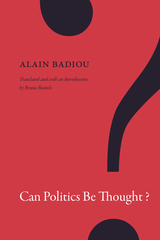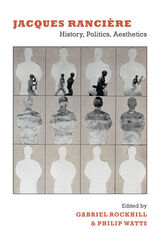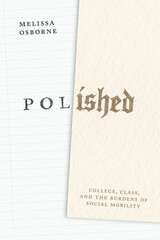


The contributors to this collection do not simply elucidate Rancière’s project; they also critically respond to it from their own perspectives. They consider the theorist’s engagement with the writing of history, with institutional and narrative constructions of time, and with the ways that individuals and communities can disturb or reconfigure what he has called the “distribution of the sensible.” They examine his unique conception of politics as the disruption of the established distribution of bodies and roles in the social order, and they elucidate his novel account of the relationship between aesthetics and politics by exploring his astute analyses of literature and the visual arts. In the collection’s final essay, Rancière addresses some of the questions raised by the other contributors and returns to his early work to provide a retrospective account of the fundamental stakes of his project.
Contributors. Alain Badiou, Étienne Balibar, Bruno Bosteels, Yves Citton, Tom Conley, Solange Guénoun, Peter Hallward, Todd May, Eric Méchoulan, Giuseppina Mecchia, Jean-Luc Nancy, Andrew Parker, Jacques Rancière, Gabriel Rockhill, Kristin Ross, James Swenson, Rajeshwari Vallury, Philip Watts

Engaging with Spinoza’s insistence on the centrality of the passions as the site of the creative and productive forces shaping society, this collection critiques the impulse to transcendence and regimes of mastery, exposing universal values as illusory. Spinoza Now pursues Spinoza’s challenge to abandon the temptation to think through the prism of death in order to arrive at a truly liberatory notion of freedom. In this bold endeavor, the essays gathered here extend the Spinozan project beyond the disciplinary boundaries of philosophy to encompass all forms of life-affirming activity, including the arts and literature. The essays, taken together, suggest that “Spinoza now” is not so much a statement about a “truth” that Spinoza’s writings can reveal to us in our present situation. It is, rather, the injunction to adhere to the attitude that affirms both necessity and impossibility.
Contributors: Alain Badou, École Normale Supérieure; Mieke Bal, Amsterdam School for Cultural Analysis; Cesare Casarino, U of Minnesota; Justin Clemens, U of Melbourne; Simon Duffy, U of Sydney; Sebastian Egenhofer, U of Basel; Alexander García Düttmann, Goldsmiths, U of London; Arthur Jacobson, Yeshiva U; A. Kiarina Kordela, Macalester College; Michael Mack, U of Nottingham; Warren Montag, Occidental College; Antonio Negri; Christopher Norris, U of Cardiff, Wales; Anthony Uhlmann, U of Western Sydney.
READERS
Browse our collection.
PUBLISHERS
See BiblioVault's publisher services.
STUDENT SERVICES
Files for college accessibility offices.
UChicago Accessibility Resources
home | accessibility | search | about | contact us
BiblioVault ® 2001 - 2024
The University of Chicago Press









